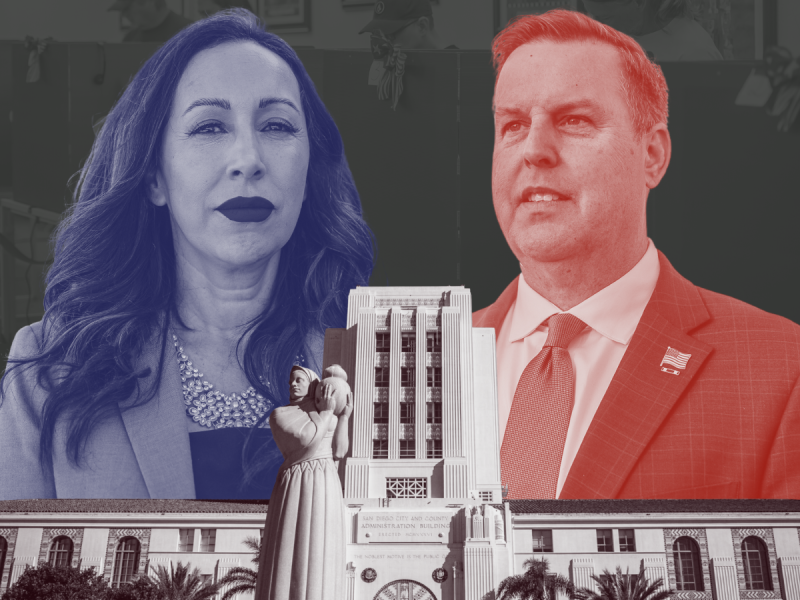
Image courtesy of Voice of San Diego
On April 8, the special election to fill the District 1 seat on the San Diego County Board of Supervisors resulted in no candidate earning more than 50% of the vote share. The race now goes to a runoff, which will take place on July 1 between Republican candidate John McCann and Democratic candidate Paloma Aguirre.
Tallies from the San Diego County Registrar of Voters show that McCann received 42.38% of the votes cast in the special election, and Aguirre received 32.33%. Candidates Vivian Moreno, Carolina Chavez, Louis Fuentes, Elizabeth Efird, and Lincoln Pickard also ran against McCann and Aguirre. Combined, these candidates earned the remaining 25.29% of the votes.
District 1 encompasses the coastal regions of San Diego south of Barrio Logan. The District 1 seat opened after incumbent Supervisor Nora Vargas resigned on Jan. 6, citing personal safety and security concerns as reasons. This follows her re-election in November 2024.
The Board of Supervisors is officially a non-partisan body according to the California State Constitution. However, current District 3 Supervisor Terra Lawson-Remer and District 4 Supervisor Monica Montgomery Steppe are both Democrats, while District 2 Supervisor Joel Anderson and District 5 Supervisor Jim Desmond are Republicans. The candidate elected to the District 1 seat will determine the board’s political balance.
McCann is the current mayor of Chula Vista. In an interview with The San Diego Union-Tribune, he explained his accomplishments in the position, including increased fire safety, creation of a homeless outreach team, and opposing a SANDAG sales tax increase to fund public transportation infrastructure.
Aguirre is the current mayor of Imperial Beach. Aguirre described some of her achievements in the role to The Union-Tribune. She cited securing funding to address the sewage crisis in South County and fighting to lower the cost of living as major issues she took on during her time as mayor.
McCann responded to the special election results in a statement released on April 8 to NBC.
“I am thankful for the hundreds of volunteers who have worked on my campaign and the thousands of voters that cast their vote for me,” her statement read. “They know I will bring common sense back to San Diego County by supporting law enforcement to keep our streets safe, getting homeless off the streets, working to get real solutions on the Tijuana sewage issue and opposing the mileage tax.”
On April 8, Aguirre posted a statement to X, formerly known as Twitter, with her response to the results of the special election.
“South County voters chose change—a leader who stands with working families, cleans up the sewage crisis, and makes life more affordable,” the statement read. “But we can’t let up —because we can’t let Trump Republicans take over San Diego County. The stakes are high.”
The registrar reports that, of the 373,641 registered voters in District 1, roughly 66,000 voted in this special election, which is about 17%. In a statement to ABC, Cynthia Paes, the registrar of voters for San Diego County, shared that voter turnout is usually lower in special elections.
“Ideally, every election is important,” she said. “We want folks to turn out for these local elections.”
According to KPBS, this special election has drawn over $2 million in campaign spending from outside groups. Independent committees, which are not allowed to coordinate with candidates, have spent this money on digital advertising, printed materials, and canvassing in District 1. KPBS partially attributes this spending to the potential for a shift in the political division of the board.
Neither candidate responded to The UCSD Guardian’s request for comment on the direction of their campaigns in the coming months.